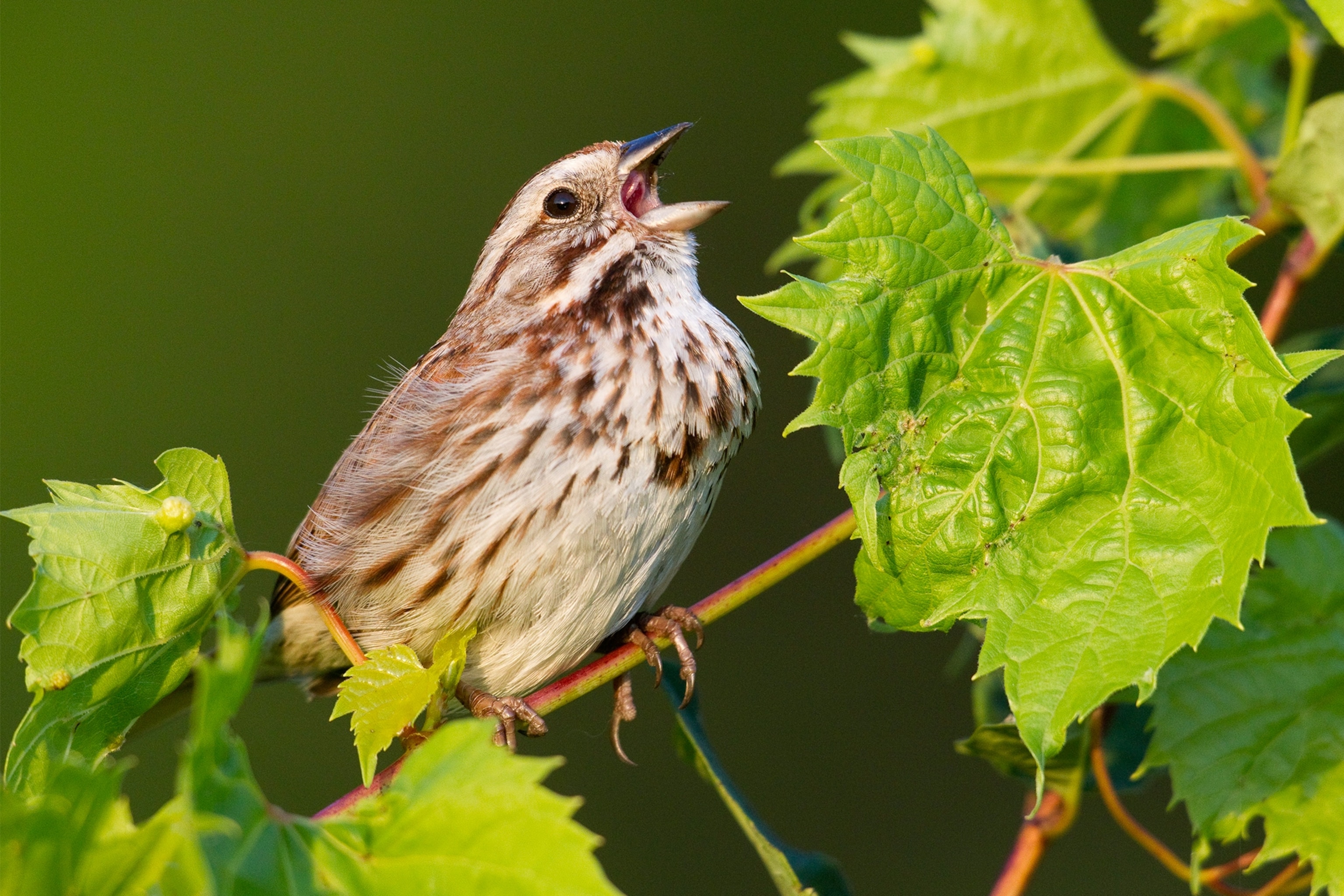
Wild Birds' Songs, Feather Colors Changed by Mercury Contamination
Mercury in the environment changes the way birds sing.
WAYNESBORO, Virginia—Standing in the woods along the South River, Kelly Hallinger held the microphone up to capture the cacophony of songs, one at a time: the urgent, effervescent voice of the house wren; the teakettle whistle of the Carolina wren; and the sharp, shrill notes of the song sparrow.
It was the summer after her freshman year at the College of William and Mary in Williamsburg, and Hallinger was working with her professor, ecologist Dan Cristol, to investigate the effects of mercury left behind by a factory. Over and over she recorded birdsong, visiting various sites in the woods and along the shore, some polluted, some unpolluted.
When she got back to Williamsburg with her tape recorder, Hallinger sorted through the hours of bird songs. She turned them into digital files in the computer, then analyzed them. The differences were striking: The wrens and sparrows along the contaminated South River were singing simpler, shorter, lower-pitched songs.
Scientists have long known that mercury is a potent toxicant: It disrupts the architecture of human brains, and it can change birds' behavior and kill their chicks. But after extensive research in rural Virginia, scientists have shown that mercury also alters the very thing that many backyard birds are known for-their songs.
Emitted by the burning of coal, mercury in the atmosphere has quadrupled since the days before industrialization, according to a recent study published in Nature. And the amount of methylmercury in animals throughout much of the world is rising, too.
"There's a global decline in songbird populations," and while the causes are unexplained, "I can't help but think that mercury and other chemicals and organic compounds are partly implicated in this," said Nil Basu, an environmental toxicologist at McGill University in Montreal.
In children exposed in the womb, methylmercury causes problems with speech, language development, learning, and memory. So understanding why mercury-contaminated songbirds can't sing their songs could help scientists learn more about how human brains are damaged, too.
"Methylmercury can affect the very motor functions that control speech—something that may have a parallel in the bird world," said Philippe Grandjean, a Harvard University environmental health scientist who led pioneering research on the IQs of mercury-exposed children.
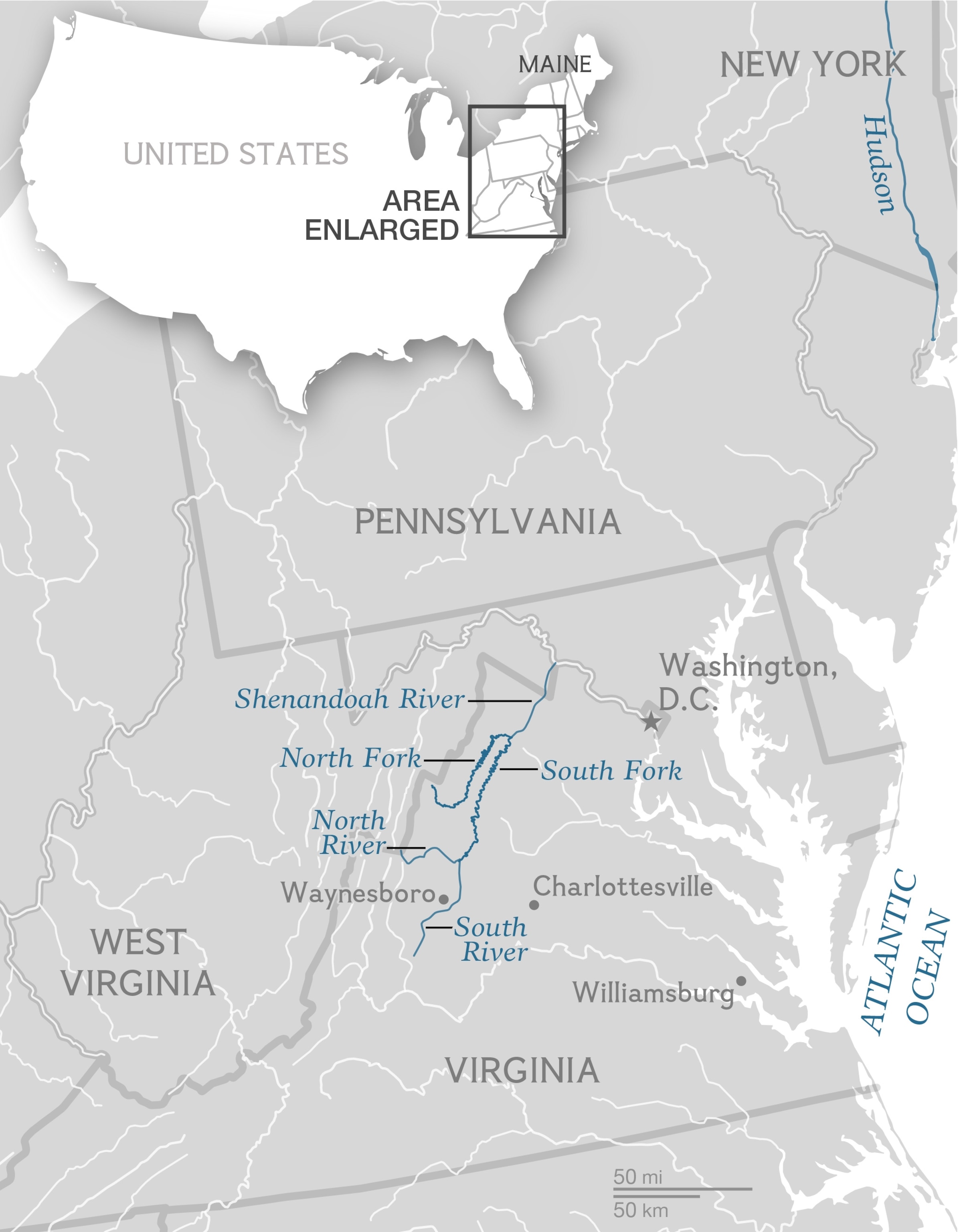
The songbirds in the woods downstream of the chemical plant "are affected profoundly by mercury in a way that suggests learning problems," Cristol said, "and this has indirect implications for humans."
Singing to Survive
Cristol is standing on a boat ramp at the confluence of the South River and the North River, two of the tributaries of the Shenandoah. High above, the spring's new arrivals tweet, chirp, and whistle from the trees. "That's a blue-gray gnatcatcher, making all that noise," he says. Another bird calls. "That's an eastern wood-pewee." A moment later: "That's a great crested flycatcher."
When you're a bird, your song matters. Songbirds sing for two basic reasons: sex and turf protection. Whether at a backyard feeder or in the canopy of a rain forest, their songs are critical to their survival and reproduction. That's why songbirds put so much evolutionary effort into learning how to sing.
Some, like wrens and sparrows, learn their songs from their fathers, a feat of memory, mimicry, and advanced brain development that's akin to humans learning to speak. Others, like the eastern phoebe, are born knowing how to sing.
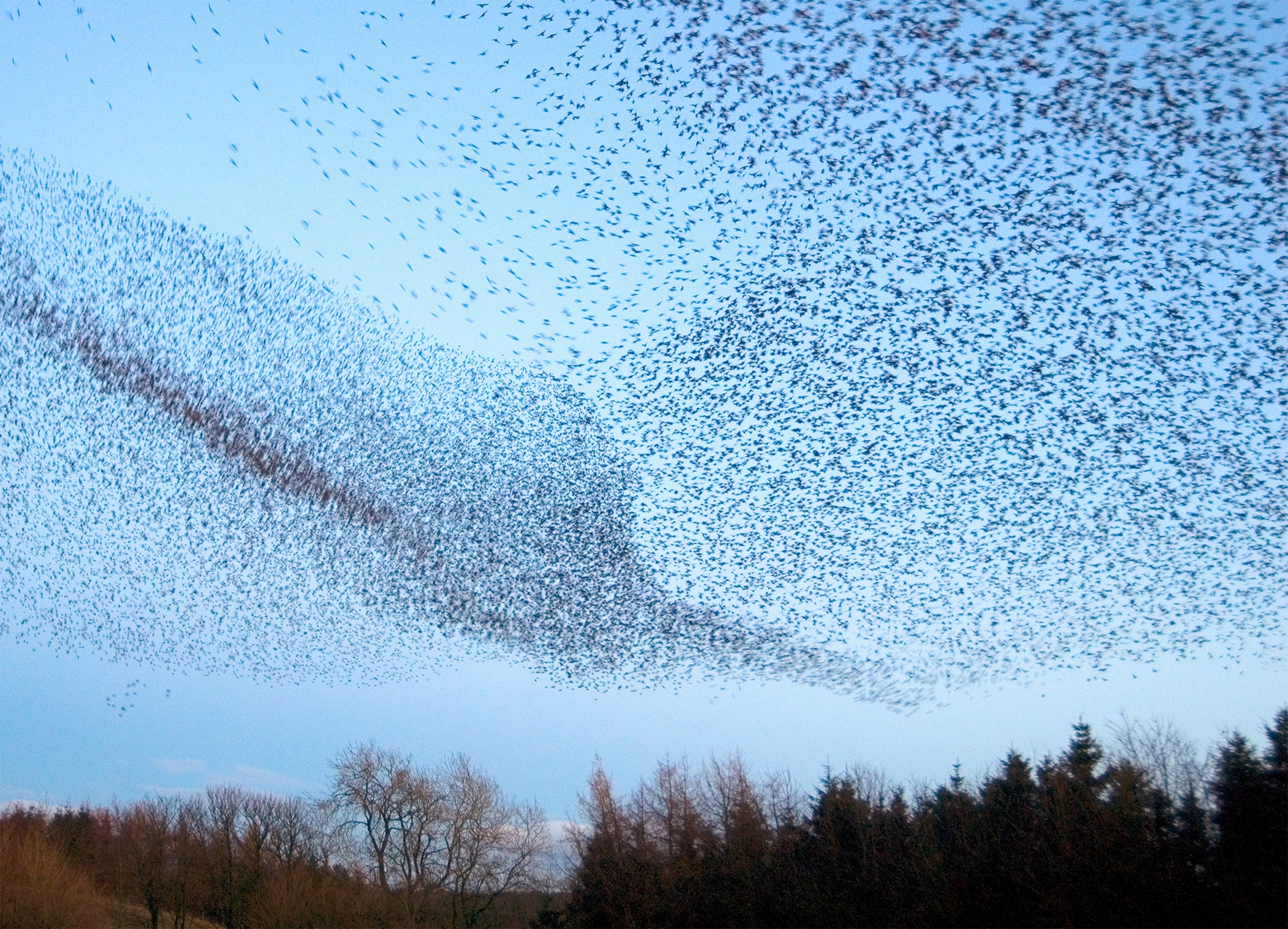
Across the globe, the breadth of sounds that birds make is awe-inspiring. Each species has its own rhythm, or tempo. The Cornell Lab of Ornithology notes that marsh wrens always sing as if they're in a hurry, while white-throated sparrows take their time. Birds sing across all four parts of the chorus, from the high soprano of a tiny cedar waxwing to the low bass of a raven. Some songs run up or down a scale, like that of the canyon wren; others stick to a single note, repeated, like the chipping sparrow. Some birds whistle, others trill, some sound like flutes, others caw.
Each song is a unique identifier of a species. Yet to the human ear, these songs are so complex that recently a British scientist developed a computer program to decode songs by species.
Cristol and Hallinger aren't the only ones who have shown that contaminants are changing the songs that have inspired poets and musicians like Shakespeare and Handel. Around a smelter in northern Europe with a lot of heavy metal pollution, a study of birds found that they knew fewer songs and sang less at sunrise than birds at two less polluted sites.
One small study of Nelson's sparrows at sites in Maine with high or low mercury levels found that the sparrows' songs were measurably different, although they weren't the same differences that Cristol's group found. Last year another study showed that chickadees along the Hudson River exposed to polychlorinated biphenyls sing strange songs.
In Virginia, 20 miles upstream of the confluence where Cristol was listening to songbirds, a DuPont factory opened in 1929 to manufacture rayon—the world's first synthetic fiber. Mercuric sulfate was part of the process that turned wood pulp into wearable thread. The company stopped using it in 1950. But by then, mercury already was polluting the river. In 1984, DuPont funded a hundred-year monitoring program for mercury and its effects on the river ecosystem, which launched Cristol's investigation of the area's birds.
Most birds known to be harmed by mercury are fish-eating seabirds or waterfowl. So Cristol set out to learn if mercury made birds have fewer chicks by studying three species of local birds that are closely connected to the aquatic food web: kingfishers, tree swallows, and screech owls.
Kingfishers nest in holes they dig into riverbanks, so Cristol and his students dug pits next to the nests, then carefully scooped their way in from the back to count eggs and young, and take blood and feather samples. For tree swallows and screech owls, they put up nest boxes. Other birds nested in the boxes, too, including bluebirds and wrens. "We sampled them just like everything else," Cristol said.
What they found surprised them: Even birds that they thought had no connection to the river, such as bluebirds, had high mercury levels. Cristol knew he was onto something unusual. "We began systematically netting every species we could find," he said. Over several summers, they took samples from 70 species of birds.
They discovered that the songbirds got their mercury from eating spiders, and that some were more highly exposed than fish-eating birds. Birds in the mercury-contaminated areas laid about as many eggs as birds that weren't contaminated did, and the eggs hatched. But many of the young died in their first week outside the egg.
Methylmercury can affect the very motor functions that control speech—something that may have a parallel in the bird world.
Then Cristol's team started looking for other effects. That's when Hallinger took her tape recorder to the river.
Originally, Hallinger and Cristol didn't know whether mercury had made the river's birds bad singers, or whether it had altered something in their brains. Maybe it made them lethargic, for example. So in her third summer at the river, Hallinger investigated another bird: the eastern phoebe, which is born with its song. She recorded their songs at contaminated sites and reference sites, and found that they sang the same tune wherever they lived.
This implied that the wrens and sparrows had something wrong with their brains so they couldn't learn their songs properly. Given mercury's neurotoxic effects on developing human brains, that was quite plausible.
Still, the song research was "kind of a fishing expedition," Cristol said. He knew that sometimes, scientists find interesting results that don't hold up under further investigation.
To test the hypothesis, Cristol took the question indoors—to the laboratory.
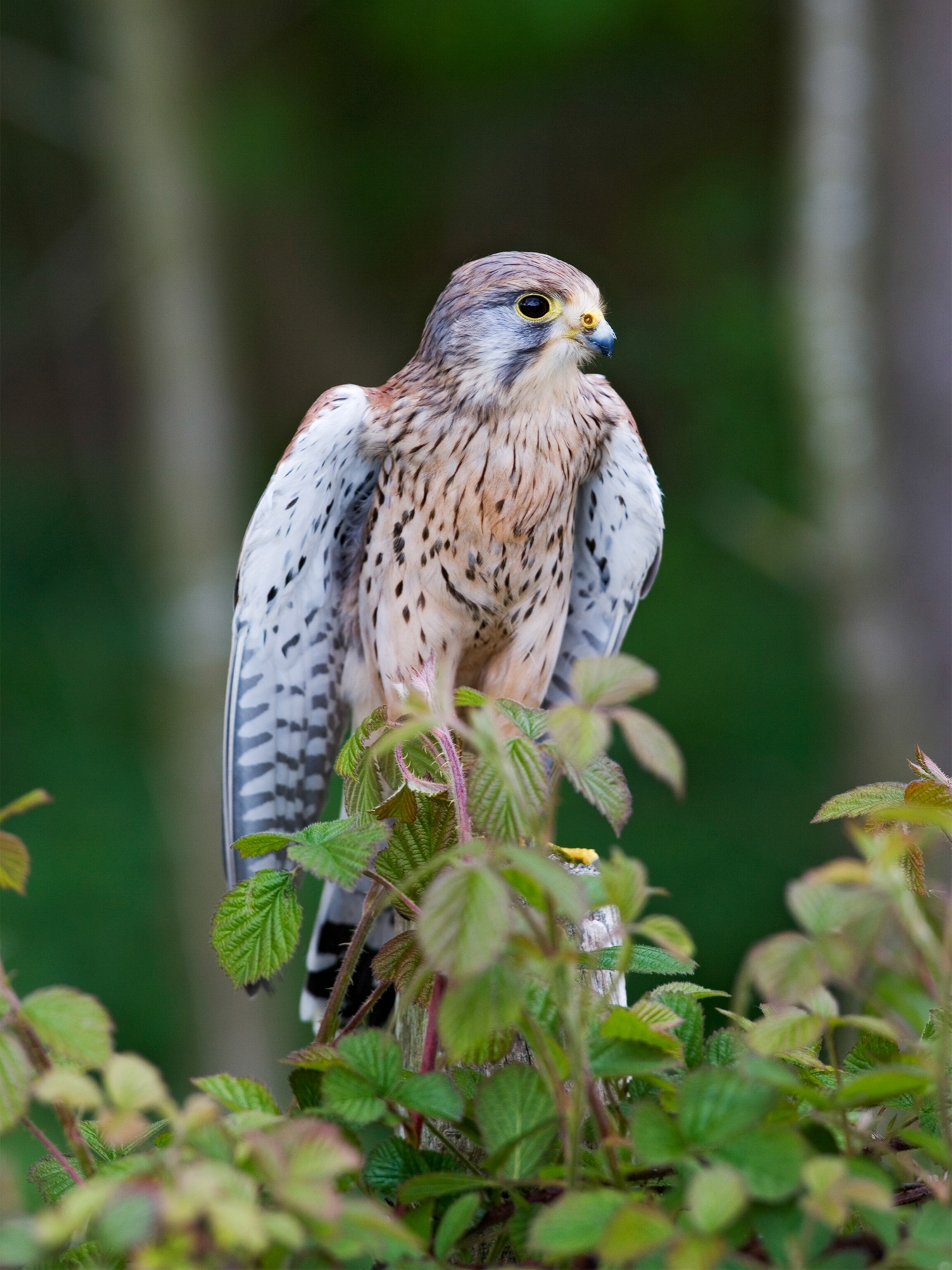
Songs From the Fathers
In a cage on the William and Mary campus, a male zebra finch is showing off. He puffs out his chest, opens his bright red beak and sings. It's a musical, fluid little song that stands out among the cheeps and squawks from other birds in cages stacked in the fluorescent-lit room. His mate hops down to the lower perch and he sings again. Then the two perch side by side on the edge of the food dish, pecking at the brightly colored, mercury-contaminated bird food.
Zebra finches, red-cheeked little songbirds from Australia, are used in labs as a model for vocal learning. Like humans learn to speak, they learn their songs as youngsters, starting out with babbling and gradually picking up their father's song. Cristol's team has used zebra finches to test a lot of the results that they found in the field. Finches raised on mercury-laden food had the same nesting problems as songbirds in the field, for example.
Postdoctoral fellow Claire Ramos, now a professor at Colorado State University-Pueblo, raised some of the finches on food containing mercury and others on uncontaminated food. Then she listened to their songs.
She played a recording. "That's a normal zebra finch. As you can tell, it's kind of a twittery, complicated song," Ramos said.
"And then here's a mercury-dosed finch," she said, playing another recording. Its song was lower pitched, less complex. Even to the untrained ear, the bird raised on mercury-laced food sang a much different song.
Sonograms showed the uncontaminated birds reached high notes of around eight kilohertz, while the mercury-fed birds' highest notes topped out at around six kilohertz.
The fathers of those birds were eating the same food tainted with mercury, since they were all in the cage together. As a result, Ramos couldn't tell if the babies were bad at learning, or if they were actually learning perfectly but the song they were learning was already garbled by their mercury-poisoned fathers.
So she did a more detailed experiment. This time, as soon as the eggs hatched, she swapped some of the fathers. Now a mercury-contaminated baby could learn its song from an uncontaminated father, and some babies from uncontaminated parents learned from contaminated males.
Ramos is now analyzing 300 hours of zebra finch songs to see what happened, but she suspects that mercury did its damage while they were still embryos in the egg, scrambling how their brains grew.
"I think," she said, "what we're going to find is that it's similar to what you see with speech learning in humans."
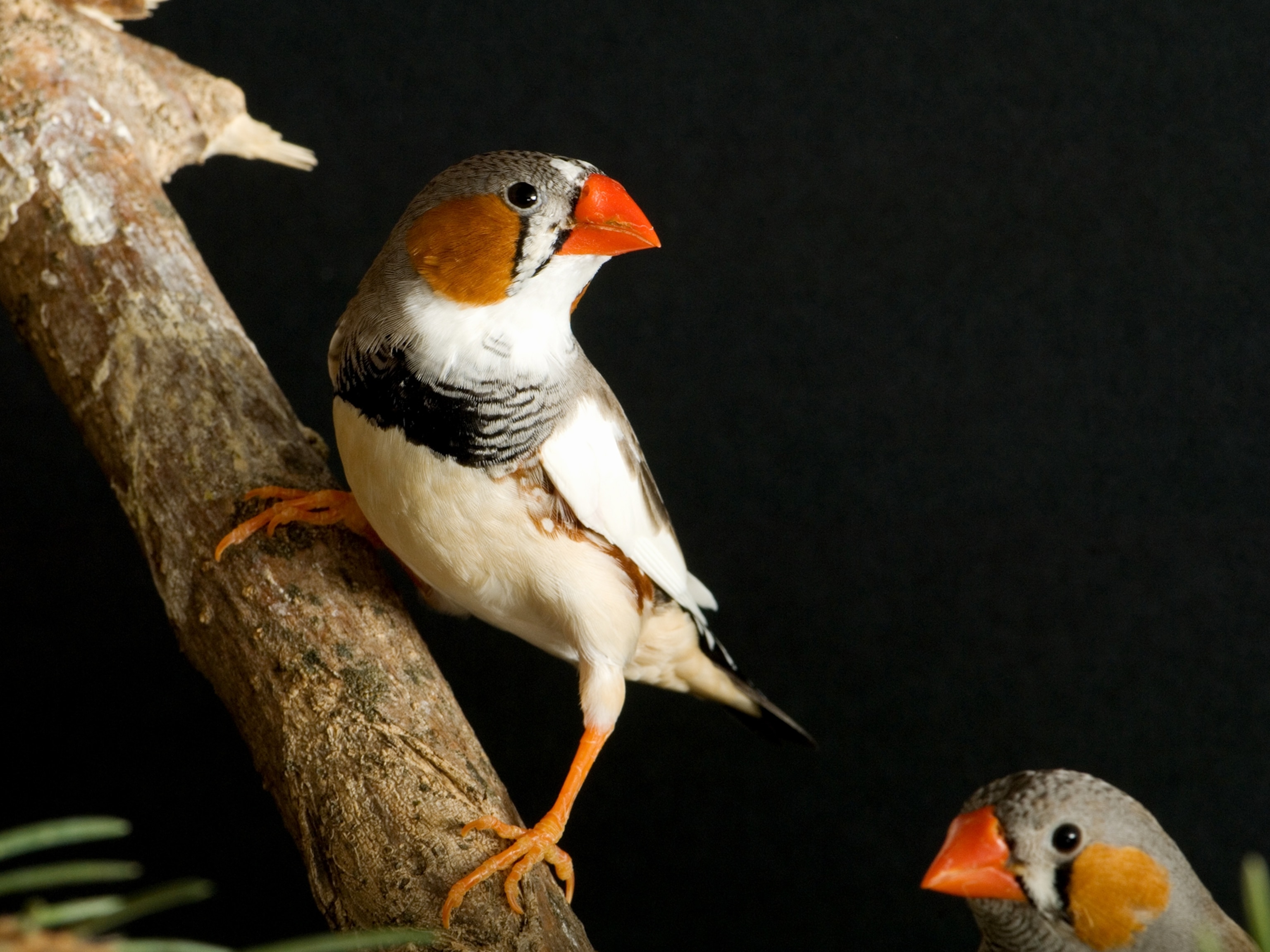
Quicksilver's Lasting Effects
When exposed in the womb to mercury, children can have learning disabilities and reduced IQs, including delays in learning how to speak.
"Everything, including song, is related to the brain," said wildlife research biologist Oksana Lane of the non-profit Biodiversity Research Institute in Maine.
Sheila Scoville, a neuroscientist at Eastern Virginia Medical School, and Lane had the rare opportunity to study the brain of a songbird that had been exposed to mercury. Looking at brain anatomy requires killing the bird. "We don't kill birds. We just don't do it," she said. But one day, someone accidentally stepped on a 12- to 15-day-old saltmarsh sparrow while extracting other birds from a net. The fact that it didn't get out of the way suggested that something was already wrong with it, Lane said. They preserved its head and took it back to the lab.
The bird's feathers showed high levels of mercury. When Scoville examined the brain, they found the distinctive brain abnormalities of Minamata disease.
In Japan's Minamata Bay in the 1950s, children began showing up at the hospital with odd neurological symptoms. They lived near a chemical plant that was discharging mercury-laden wastewater directly into the bay. It was collecting as methylmercury in fish and shellfish, poisoning people who ate them and attacking the developing brain stems of babies, a syndrome that became known as congenital Minamata disease.
Thousands of Minamata children exposed in the womb were born with severe neurological damage, including mental retardation and problems speaking.
Mercury wasn't always considered a toxic threat. Because it is the only metallic element that is liquid at room temperature, humans have been fascinated with it for centuries. Known as quicksilver in its liquid form, it's admired for its ability to evade the touch and transform itself into erratic shapes. Early chemists and philosophers believed that mercury had magical properties. It was the quick-change artist, the catalyst, the trickster.
Yet, mercury poisoning has been documented for centuries. Felt makers who used mercury compounds to make materials for hats suffered severe neurological effects, which led to the phrase "mad as a hatter."
Mercury crosses from the bloodstream into the brain, and it can be particularly dangerous for developing brains, which is why pregnant women are advised not to eat swordfish and other fish with high levels of mercury.
Most birds known to be harmed by mercury are fish-eating seabirds or waterfowl.
Beginning in the mid-1980s, Harvard's Grandjean and his colleagues began pioneering research in the Faroe Islands, where people eat the flesh and blubber of pilot whales. After monitoring children there for two decades, they showed that methylmercury exposure in the womb reduces the cognitive abilities of children. Although their symptoms were far more subtle than those in children with Minamata disease because they had much lower exposures, Faroese children still experienced diminished memory, language, and motor skills linked to their mother's mercury levels.
"In the Faroes, the most sensitive test to detect methylmercury neurotoxicity in children is the Boston Naming Test, a language task that reflects language acquisition and recall," Grandjean said. It is plausible, he said, that the neural mechanism that controls language and memory in the human brain is similar to the mechanism in bird brains that enables them to learn songs.
Minamata children often show symptoms of a syndrome called dysarthria. "The patients are unable to speak and just utter sounds that are difficult to recognize as words. Still, they are capable of understanding the spoken words," Grandjean said.
Other scientists are trying to explore what exactly mercury does to birds' brains. Eagles exposed to mercury in the wild have altered brain receptors and enzymes. So Jennifer Rutkiewicz of the University of Michigan in Ann Arbor injected mercury into the embryos of chickens, quails, and murres, as well as hatchlings, to look for chemical or pathological changes in the cerebrum and cerebellum. She found none. She suspects, however, that it could mean longer-term exposure through diet is more important than exposure as an embryo, or perhaps other species are much more sensitive.
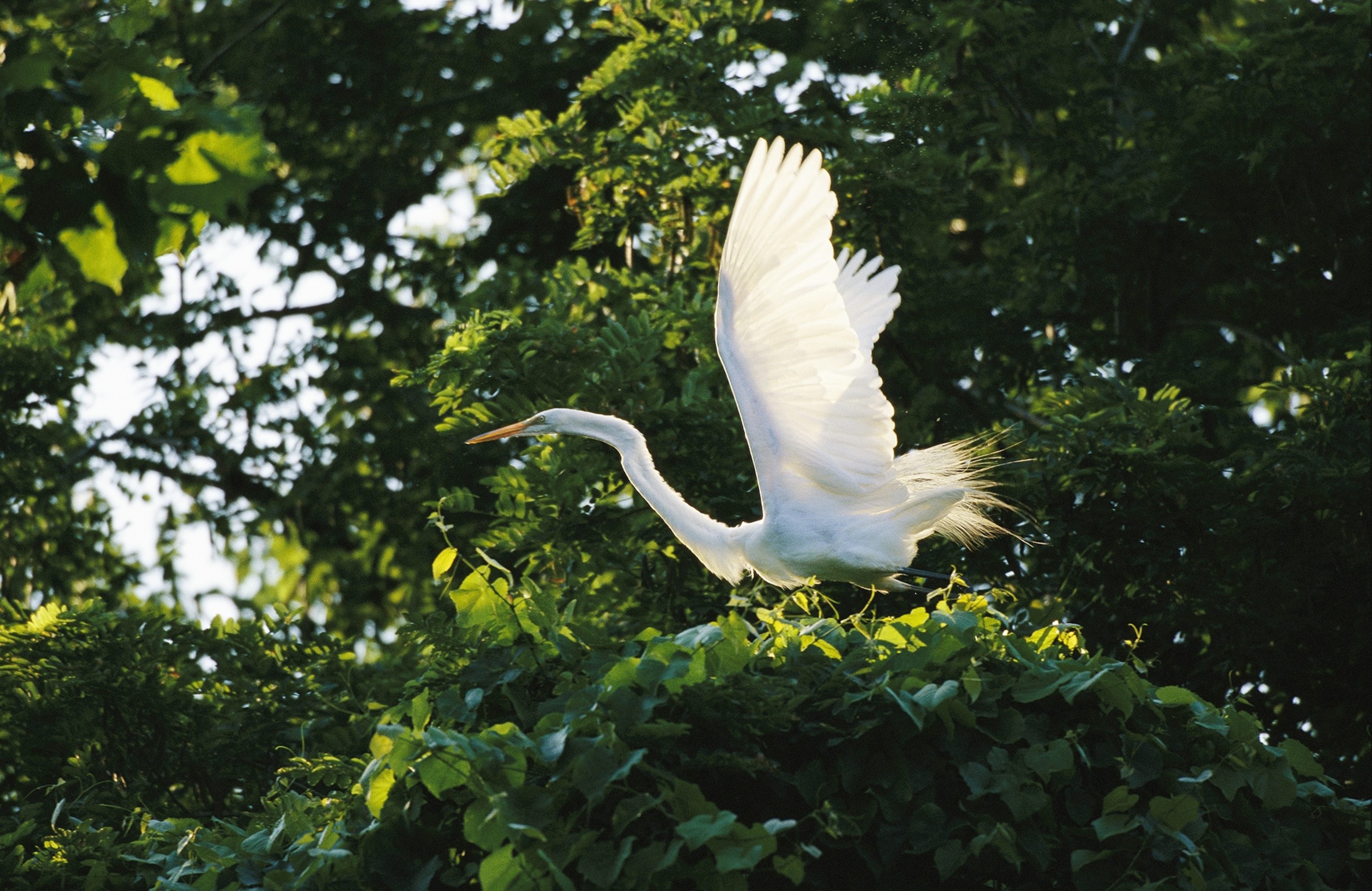
"Such a Toxic Contaminant"
Mercury harms birds in many other ways, too. When embryos are injected with mercury, chicks are born with missing eyes, deformed bills, and other grotesque defects because it's an "extremely potent embryo toxicant," said Birgit Braune, an Environment Canada toxicologist. She has found that the embryos of some species, such as kestrels, ospreys, and egrets, are ultra-sensitive to mercury, while others are less so.
If starlings eat mercury-laced food for a year, their ability to fly is impaired, Cristol said. That could be deadly if they were trying to escape a predator. Other effects include disrupted stress hormones—less of the "fight or flight" response—and suppressed immunity, which could leave birds vulnerable to diseases.
Songbirds in a contaminated area also have a skewed sex ratio, with fewer females, Cristol said. And studies in everything from finches to albatrosses have found that mercury-contaminated birds have fewer fledglings. Loons in high-mercury areas leave their eggs unattended more often.
The birds with the odd songs in Virginia didn't die from the mercury in their eggs. Their songs weren't silenced. Yet they have been altered.
When dosed with mercury, songbirds also seem to change their choices of mates, and the memories of their offspring are impaired—they forget where their food is.
Even the color of their feathers can be different.
"Mercury definitely causes problems for wild songbirds," Cristol said.
Mercury is considered one of the world's most dangerous and widespread toxicants, and its emissions are increasing in many areas in lockstep with the rise of coal-burning power plants in Asia, gold mining, and waste incinerators.
The birds with the odd songs in Virginia didn't die from the mercury in their eggs. Their songs weren't silenced. Yet they have been altered.
"There are multiple ways for mercury, as a neurotoxin, to impact the behavior and physiology of vertebrates, and we really don't have a clue about all the ways those impacts can manifest themselves," said David Evers, who studies loons for the Biodiversity Research Institute in Maine. "We should be very careful as a society about how we go about managing such a toxic contaminant."
Follow Helen Fields and Alanna Mitchell on Twitter.
The Winged Warnings series is produced by Environmental Health News, an independent, nonprofit news organization, and published in conjunction with National Geographic. Read additional stories in the series at EHN's website. Follow EHN on Twitter.